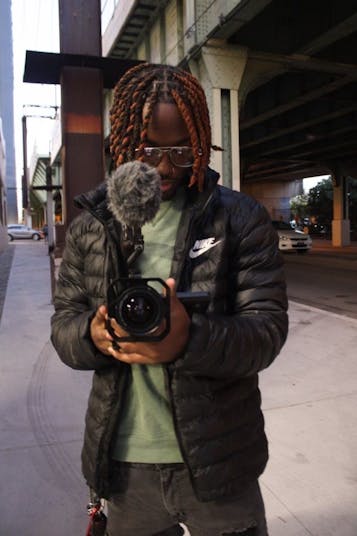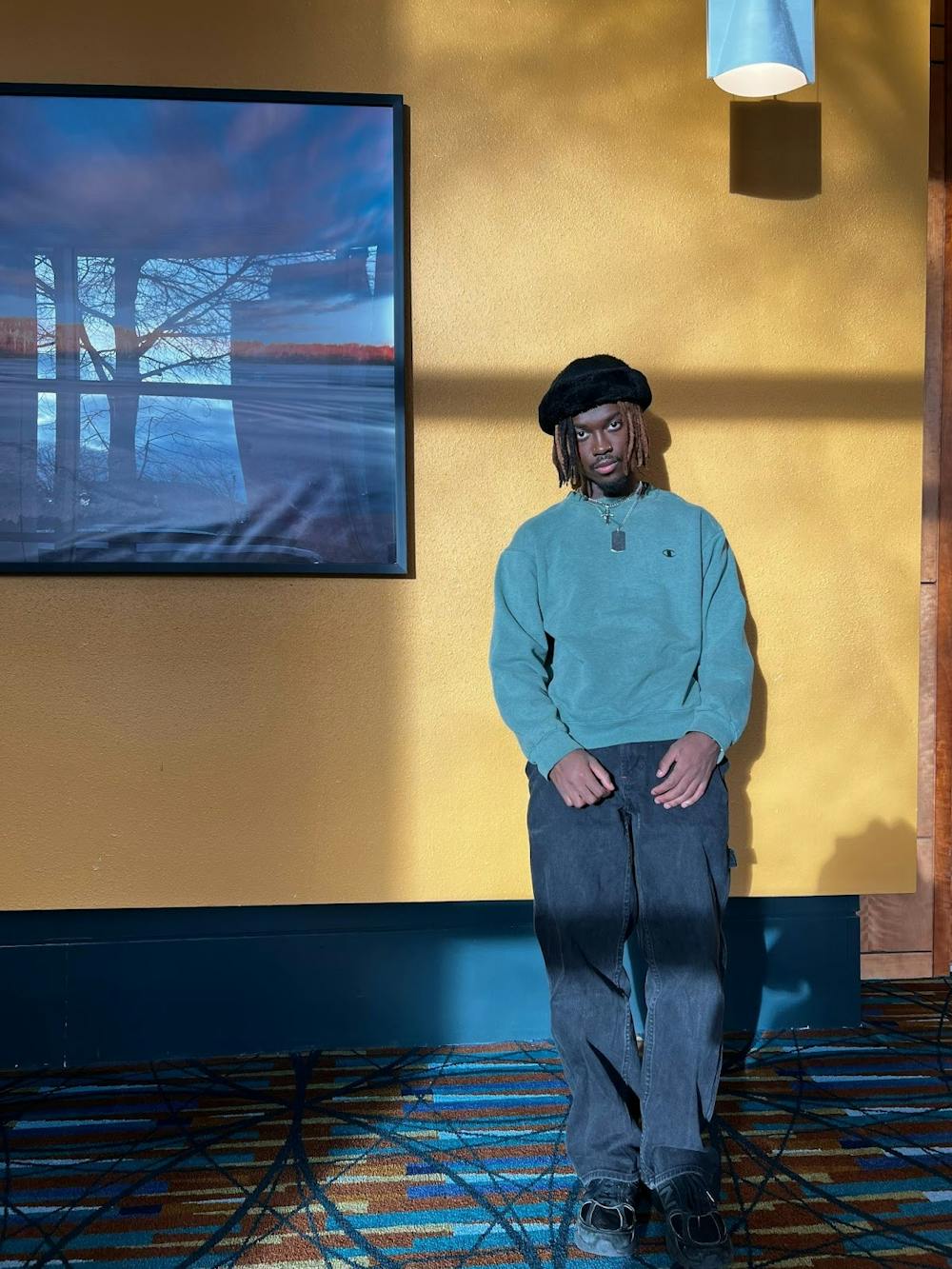From writing stories and piecing together a paper book in kindergarten to performing an original rap song at his fourth-grade talent show, Zahkee Williams always looked for a creative outlet. Until high school, his moments of creativity were short-lived sparks that eventually fizzled out. That changed when he began to recite poetry at his school’s showcases in Philadelphia.
Poetry ignited a flame within him that wouldn’t be easily put out. He felt it burn while sitting in the audience during a class play his sophomore year.
“It seemed like they were trying to speak on real things in almost a satire-type of commentary, but it wasn't coming across,” Williams said. “It had missed jokes and bad stereotypes. So literally, while sitting there, I texted my friend. I told her, ‘Yo, I could do this and do better.’”
Williams tried to turn his idea into a reality with sponsorship from his high school’s African American Student Union and help from a team of writers and artists he put together over the next week. He worked with fellow students to produce something that reflected all of their creative voices, he said.
“I knew that I wanted to stay true to my origins as a poet and as a spoken-word artist, so I wanted to incorporate that,” Williams said. “I knew I wasn't like a singer or writer, so [it wasn’t] going to be a musical, but it can have those performance aspects that have a rhythm and musicality to it.”
Countless after-school meetings turned into busy summer nights, and the spoken-word play came closer to completion. By the start of his junior year, Williams and his team released a poster to tease “Speechless,” a play that responded to students' issues that the school failed to address. The poster created excitement within the school community as the team finalized the project, he said. Two weeks before the opening, the students were left disappointed when the COVID-19 pandemic put the world on pause.
The show never went on. Instead, everyone was forced to put down their scripts, leave the stage behind and isolate. During quarantine, Williams said he turned to his poetry and spirituality to feel less lost in a world he no longer recognized. Revisiting his poems a year after, he can see how much he was struggling and appreciates them more than ever.
“Even in the times where you don't see how that puzzle piece fits into the bigger picture, you will in time, and that's something that I've realized,” Williams said.
The pandemic halted what would have been his first major project, but Williams believes the good and the bad has made him who he is now, he said. Wondering what could have happened if Williams’ creative side took off earlier is irrelevant to his present life. Even without the play or formal artistic training, Williams nurtured his creativity himself. Now, as a sophomore majoring in film at the University of Richmond, he’s launched his own media brand and is using his talents to bring other creatives into the spotlight.
****
Although he may appear sure of himself and his path, Williams wasn’t always certain that film would be the right fit, he said. Originally, he planned on being a pediatric surgeon and took a chemistry class his first year at UR as an introduction to the sciences.
“I knew that if I dedicated myself to the field that I would be able to make it, but I knew that this wasn't what I was meant to do,” Williams said. “It just didn't sit right in my spirit, that this is something that I was going to continuously do. So, the whole freshman year, I was pretty much lost.”
Enjoy what you're reading?
Signup for our newsletter
Williams thought about things he enjoyed like the creation of “Speechless,” despite it never having reached the stage. He knew that the time for the play had passed, but he wasn’t ready to let his creative spark die, he said.
Williams received a 4K camcorder from his mom for his 19th birthday and had time to play around with it during spring break of his first year at UR. He filmed a vlog of him and his friends spending time together and creating memories. Suddenly, something clicked.
“I was with a group of friends when I got the idea to do a documentary, because the conversation we were having was so important,” Williams said. “We were specifically talking about being an artist and the struggles of identifying as an artist in a time where art can sometimes be looked down upon or seen as the riskiest career.”
Among the friend group were playwrights, poets, rappers and other creatives who were just a few members of the growing Philadelphia art scene, and Williams wanted to capture it all, he said.
“I knew that if I just went for it then I might capture something magical, something truly historic, because of how many different creatives and how many people have the potential to really make it,” Williams said. “I knew that I didn't have all the skills that I might have wanted, and I knew that I would have downfalls, but I also knew that I would learn throughout the process.”
Williams continued to record footage for his documentary during the summer between his first year and sophomore year, but he felt he needed to gain as much experience as he could to make his project the best it could possibly be. With only a few quick videos to his name, he applied to a summer internship at Immortal Vision Studio in Philadelphia. They took a chance on Williams, and he was selected as their videographer intern.
“I knew I was on a path that was meant for me because things started aligning,” Williams said. “The internship would not have happened if it wasn’t for a specific moment in time.”
Williams had just returned home for the summer and was visiting a friend when he got a call from his older sister, he said. They had talked about how he wasn’t sure what he wanted to do in the future, but that film piqued his interest. Her husband had a connection with the CEO of the studio, and Williams was able to speak with him.
“It was what I needed in order to improve and learn and be able to put things together like I wanted to,” Williams said, “and it happened on a whim.”
After the summer came to an end, Williams’ film aspirations continued. He returned to UR wanting to improve his skills as a videographer, but he had a big decision to make. He was faced with the million dollar question: What’s your major?
“If you want to be a doctor, there's a blueprint, but as an artist, there's really not a blueprint for how to be successful,” Williams said. “You find and you navigate the path as soon as it comes to you. I definitely have my fears, but I know that my biggest regret in life is if I didn't take this risk.”
The “struggling artist” trope drives for anxieties about the future to encroach, but a shadow of doubt cast over an artistic mind isn’t enough to stop Williams. He can’t ignore what his body is telling him to pursue, he said. So, even without a template to follow, he’s sure of one thing: he must create.
“He wants to make something good, spectacular even,” said Claud Dure, Williams’ high school friend. “He has a deep ambition to be more than better, more than just the basic videographer.”
Williams decided to major in film and eagerly registered for two film classes. His production class provided hands-on learning, while film studies helped him view things analytically. Together, they gave Williams new skills to apply toward his work. The next step was for him to solidify his image before sharing his projects, he said.

Williams films the debut of his new brand logo at a skate park in Philadelphia.
VZNRY Media is a multimedia brand that focuses on pushing the boundaries of visual and creative storytelling,” Williams said about his newly created brand.
With the help of his high school friends, he published a fresh logo and website to formally create a structured space for his projects and ideas. The first published video installment features four clips that peek into the underground art scene in Philadelphia; viewers must wait for Williams’ documentary for the full inside look.
Williams' time and energy have been focused on completing the documentary by summer, but he can’t help thinking of ideas for new projects. “The videography stuff is great,” Williams said. “I love it, but I want to be a film director. I want to make movies.”
Once his documentary is finished, Williams plans on creating a short film that falls into his favorite genre, Afro-surrealism, he said.
“It's something that you might have to watch more than once to sort of understand, and that level of engagement is something that I want from my audience,” Williams said. “I want my film to have real depth but also to seem sort of simple and surface level.”
His short film appears to be his next step as a creator, but he acknowledges that not everything is up to him. Williams believes something greater is guiding him down a path, and he must not only trust but love the process.
“If my path leads me somewhere else, then that's just what my path is supposed to be,” Williams said. “I'm very accepting of whatever my future holds, because I know that in this current time I'm pursuing something that I love, without a doubt. In this life that can seem so long but so short, every moment that you waste second guessing yourself you could be using to move forward.”
Williams took his own advice and didn’t waste any time. He managed to create a documentary, secure an internship, establish a media brand and much more in the span of a year thanks to his mindset. If he ever feels himself getting sidetracked by negative thoughts, he looks for signs of motivation, he said.
A slight tap on his phone’s screen reveals an image of a director’s chair with the phrase, “stay hungry, giving up is not an option” as his wallpaper.
“Whether I’m unconsciously looking at it or not, it's always there,” Williams said. “That message will always be something that I see every single day to really affirm that giving up is not an option. It's just not.”
Contact features writer Ale Egocheaga at ale.egocheaga@richmond.edu.
Support independent student media
You can make a tax-deductible donation by clicking the button below, which takes you to our secure PayPal account. The page is set up to receive contributions in whatever amount you designate. We look forward to using the money we raise to further our mission of providing honest and accurate information to students, faculty, staff, alumni and others in the general public.
Donate Now



